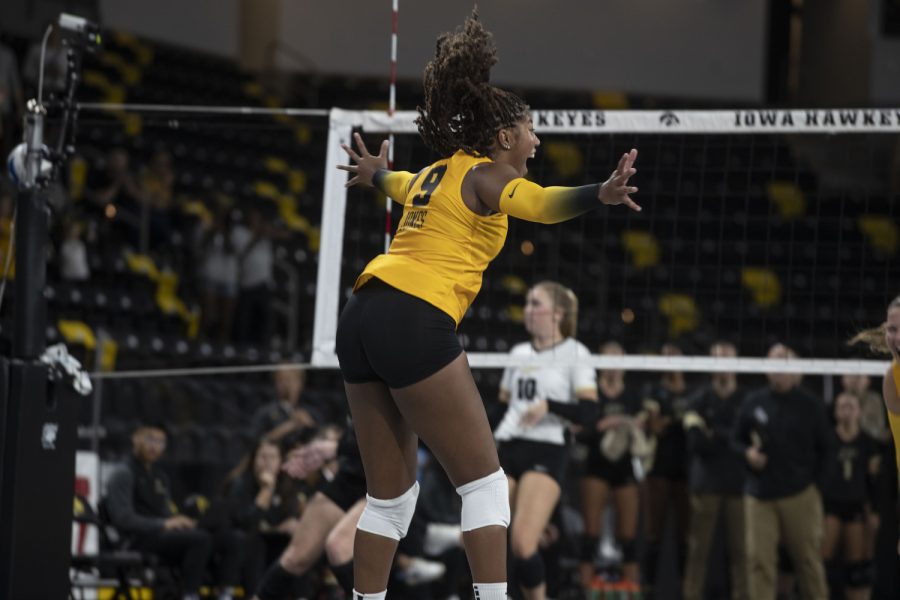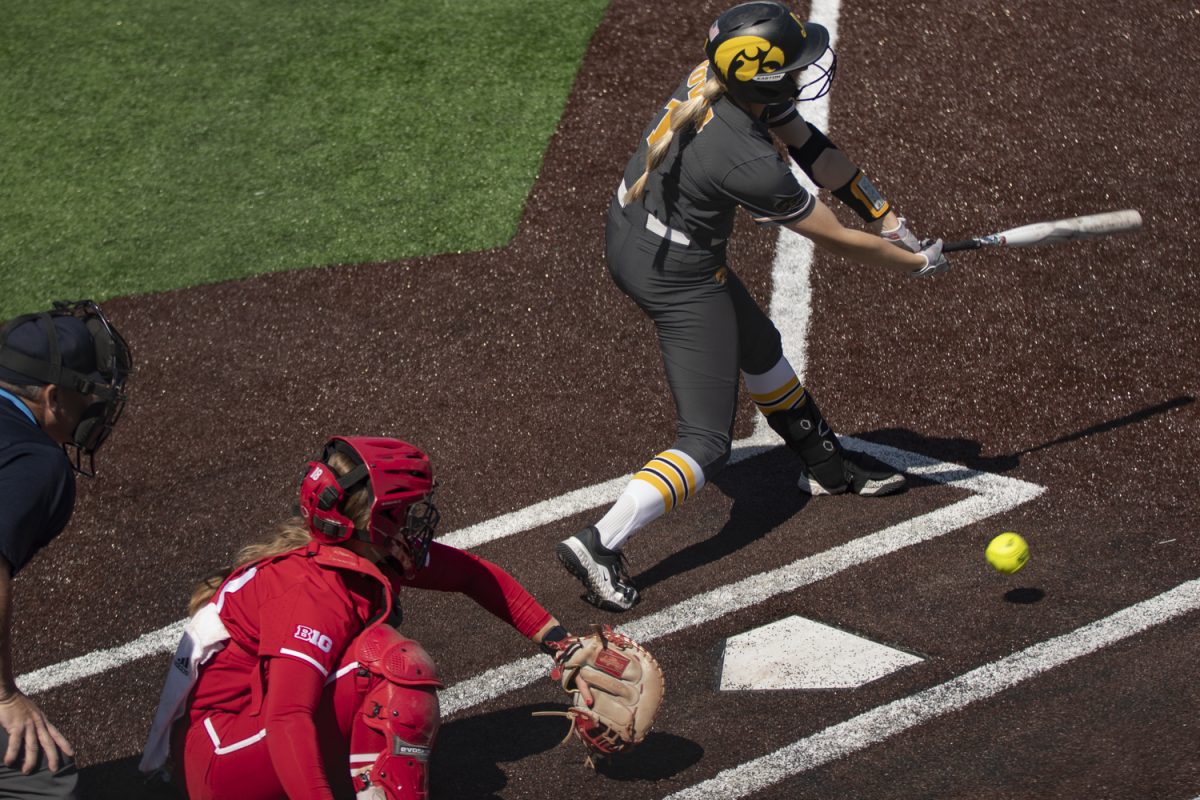
With Iowa’s win over Northwestern, head coach Lisa Bluder passed the legendary C. Vivian Stringer and former men’s coach Tom Davis as the Iowa basketball coach with the most wins. Bluder has coached her Iowa teams to 270 wins and counting, but her time spent patrolling the sidelines is more than wins and losses.
When Lisa Bluder began coaching women’s basketball, she thought she’d try it for one year.
That seems strange, because Bluder is now the Iowa women’s basketball coach with the most wins, and she has been a figure on the sidelines for three teams over the course of 30 seasons.
What’s even stranger is how Bluder first came to coaching.
In 1984, Bluder, who had recently graduated as a three-year starter for University of Northern Iowa, was taking care of 90-year-old Dorothy Buech with her husband to be, David Bluder.
Periodically, Lisa Bluder would go to Buech’s home to check up on her or take her out to eat. One time, Buech was particularly excited — she knew that Bluder had an interest in coaching, and she had just found an advertisement in the paper for the St. Ambrose women’s basketball coaching position.
“I said, ‘Dave, I’ve got good news and bad news,” she said. “The good news is that they offered me the job. The bad news is that it pays $2,400 for the year. And he said, ‘That’s all right, let’s try it and go for it.’”
Bluder negotiated for $100 more per year and accepted the job.
“To me, it was because I loved the game. I missed it, I wanted to be involved in it again,” she said. “I really just went for it for the joy of coaching.”
The pay wasn’t the only difficult aspect. When she agreed to coach, she was also agreeing to take care of almost every aspect of the basketball program.
For the next year, she hired officials, scheduled facilities, moped the floor, washed uniforms, and spearheaded the team’s fundraising — which consisted of selling Homecoming t-shirts and cheese-and-sausage packets.
The one job Bluder vividly remembers not having to do was tape ankles.
“You do everything,” Bluder said. “Absolutely everything.”
She still loved it, but never did she imagine that her time there would eventually lead her to Iowa.
“You learn a lot from doing those different things,” Bluder said. “I wouldn’t have traded it for anything.”
First year at Iowa
Bluder initially applied for head coach at Iowa in 1995, when C. Vivian Stringer left for Rutgers University. But that job went to longtime assistant coach Angie Lee.
Five more years passed before the opportunity presented itself again.
“I was disappointed then, because I thought I could do the job,” Bluder said. “But looking back, it’s probably the best thing. First of all, I didn’t have to follow a legend like Vivian. And second, it gave me five more years to hone my skills at Drake.”
When Iowa came knocking again, Bluder was ready.
She was given a five-year contract — at the time believing that it would be her only contract with Iowa.
“You don’t ever dream of being someplace this long,” Bluder said.
Following Stringer’s departure, the program stumbled. Its number of wins had slowly decreased, culminating in a nine-win season before Bluder took the reins.
In her first season, Bluder showed signs of bringing the Hawkeyes back to its winning ways. They reeled off 21 wins, but the season wasn’t as enjoyable as the record might suggest, at least not the beginning.
Bluder and her staff had to earn the trust of her new players, almost all of whom Lee had groomed.
“I think that’s the case for every single program and every coach that takes over. When you go into a program and there’s players that you didn’t recruit, there’s always going to be something,” Drake head coach and former Iowa player Jennie Lillis Baranczyk said. “That’s a hard thing for the players to get over.”
Once the players bought into Bluder’s plan and her ways, winning ensued.
The Hawkeyes ran the table in the 2001 Big Ten Tournament, taking the postseason Big Ten championship, and Bluder won Big Ten Coach of the Year. The Hawkeyes made their first NCAA Tournament appearance since the 1997-98 season.
“There’s just no way I could describe it besides it was just a magical ride,” Bluder said.

A player’s coach
Even if the player’s took time to adjust to Bluder’s coaching style — the one thing she established from the beginning were the relationships with her players.
“Bluder is one of those coaches that is very professional, she’s going to demand a lot from her players,” Lillis Baranczyk said. “And yet she’s a wonderful teacher and just really full of life.”
To this day, Lillis Baranczyk — one of Bluder’s five former players who have gone on to coach — keeps in contact with Bluder.
“She’s still a mentor of mine,” Lillis Baranczyk said. “Every move that I have made, every time that I have had something come up, she’s one of the people that I call and ask for advice. If I didn’t, it would be dumb on my part.”
As Bluder has done with so many of her teams, her current players are constantly reminded about their roles not only as players on the basketball court, but in the community as well.
“I think that people are drawn to her and drawn to this program,” freshman Ally Disterhoft said. “She cares about us as young women and not just basketball players.”
Bluder’s openness has translated into her player’s success off the court. In her time at Iowa, she’s coached 30 players to the status of Academic All-Big Ten, and of the players who have stayed with her for four years, all of them have earned degrees.
“What we’re trying to do is win championships but also prepare tremendous young women, who are going to go out and make the world even better,” assistant coach Jan Jensen said. “That really is our mission.”
The beginning of a partnership
In Bluder’s 14 seasons as the head coach at Iowa, the Hawkeyes have endured one losing season.
This consistency is rarely reached, especially in college sports, because every year is a new team with new faces and roles to fill. But with each season, the one thing that remains consistent at Iowa is the three coaches on the sidelines.
During Bluder’s time at Iowa, her coaching staff has essentially remained the same: Bluder, Jensen, and Jenni Fitzgerald.
“The trust and loyalty have always been there,” Jensen said. “I don’t doubt anything that Jenni or Lisa has prepared.”
Jensen has the rare perspective of being a player under Bluder and an assistant coach for her as well. Her senior year at Drake was Bluder’s first year there. Jensen led the nation in scoring that year and then traveled overseas to play professionally for BTV-Wuppertal in Germany.
Two years later, she returned home in hope of becoming a graduate assistant. But Bluder offered her an assistant-coach position.
“When she took that chance on me that young,” Jensen said. “And I didn’t go through the typical ranks, that was saying something, and I never forgot that.”
That trust went a long way in Jensen’s mind. It’s one of the many reasons that she has stayed at Iowa even with numerous offers to become a head coach elsewhere.
“When you find that you’re a part of something special, I think what everybody thinks would be the next logical step can actually be an error,” she said.
Fitzgerald was a player at Drake before becoming a part of the program. She shared the court with Jensen for three years, but she wasn’t a person who knew she wanted to coach after her playing days were over.
After spending time as a graduate assistant at Southern Illinois, she interviewed to coach with Bluder. But at the time, the move wasn’t so much about coaching; Fitzgerald was hoping to acquire business contacts and apply them to her dream job of joining a shoe company such as Nike or Converse.
Twenty-two years later, Fitzgerald is pretty glad that interview landed her a job with Bluder and Jensen.
“If you didn’t really love who you were with, it would make this job miserable,” Fitzgerald said. “We’re fortunate in that we love who we are with.”
Bluder also shares a connection with another coach, whom she’s never coached with, but one that once filled Carver-Hawkeye Arena on a daily basis.
Following a legend
It’s hard to talk about women’s basketball at Iowa without mentioning Stringer.
Over 12 seasons, Stringer turned a losing Iowa program into a national powerhouse. She compiled a record of 269-84, won Big Ten Coach of the Year twice, and took the 1992-93 Hawkeyes to their first and only Final Four.
As with Bluder, Stringer’s influence extends outside the arena and into the community. Players and coaches alike looked up to her, Bluder included.
At the time, Bluder was still at St. Ambrose. She was new to the coaching world and was looking to soak up as much information as possible. Luckily, one of the greatest college coaches ever operated in the same state.
Bluder knew a graduate assistant for Iowa at the time, and whenever she could, she studied Stringer’s practice tapes.
“I would sit and watch her practices,” Bluder said. “But Vivian never had a loud voice … so I would really have to crank it up sometimes to hear the coaching advice that she was giving to her players.”
Bluder’s admiration for Stringer goes beyond her being a role model on the court. One story in particular helped illustrate this.
In 1997, Bluder’s husband was involved in a car accident in Davenport, which put him in a coma for 72 hours. Bluder was in Cincinnati at the time receiving an award at the women’s basketball Final Four.
Unable to make it home until the next day, Bluder and Jensen stayed up all night ironing clothes and doing anything to pass the time. When they reached home, the first person besides her staff and family to call was Stringer, who had lost her husband, Bill Stringer, to a heart attack in 1992.
“She said, ‘I know what you’re going through,’” Bluder said. “She just reached out, which was really neat.”
From Stringer’s point of view, making the call was a no-brainer.
“You just want to let her know that you know what she’s going through and to offer any sort of support that you possibly can,” she said.
While Bluder has been at Iowa, the two coaches have faced each other three times. No matter the result — Stringer has won two of the three — playing Iowa is something that Stringer has no interest in.
“I promised that the one time I did come back to Iowa that it was never going to happen again,” Stringer said. “It was strange sitting on the visitor’s bench.”
But that will happen again. Starting next season, Rutgers will join the Big Ten and the two teams will face off on a yearly basis.
“All of a sudden we’re in the Big Ten,” Stringer said. “You do what you have to do. But I don’t have to enjoy that.”
Homage to the coach
In the weeks leading up to the record being broken, Bluder has fielded constant questions about what the record meant to her. Every time, she gave the same answer.
“To me, it’s longevity. It’s not that big of deal to me,” she said. “My opinion is it should have happened a long time ago.”
With those responses in mind, it’s no surprise that after her 270th win, she attributed the success to her players and fellow coaches.
But in asking those that spend the most time with her, you’ll find that Bluder’s playing down the win is not a reflection of its unimportance, but rather Bluder’s selflessness.
“I think anytime you get over 600 wins and become the all-time winningest coach anywhere, I think that says something about who you are, what you’re about, and the type of people you attract,” Jensen said.
After the buzzer sounded, a video tribute played over Carver-Hawkeye Arena’s video screen. It showed moments in Bluder’s career, including when she was first announced as Iowa’s head coach.
Following the tribute, the crowd rose to a standing ovation, and Bluder, in a moment in which it would have been perfectly fine to soak it in by herself, called her assistant coaches and players over to celebrate with her.
In her 30th year of coaching, she still put the relationships with her players and peers above the wins and losses.
“I’m very thankful to [Christine Grant], Jan and Jenni, who have been here the entire time, they deserve so much of this because they have been a part of every single one of these victories, and I couldn’t think of two better people to go through it with.”






